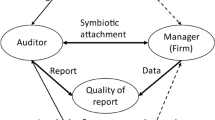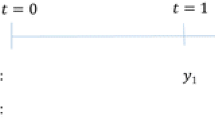Abstract
Several empirical findings have challenged the traditional view on the trade-off between risk and incentives. By combining risk aversion and limited liability in a standard principal-agent model, the empirical puzzle on the positive relationship between risk and incentives can be explained. Increasing risk leads to a less informative performance signal. Under limited liability, the principal may optimally react by increasing the weight on the signal and, hence, choosing higher-powered incentives.
Similar content being viewed by others
References
Allen D, Lueck D (1992) Contract choice in modern agriculture: cash rent versus crop share. J Law Econ 35: 397–426
Anderson E, Schmittlein DC (1984) Integration of the sales force: an empirical examination. RAND J Econ 15: 385–395
Benabou R, Tirole J (2006) Incentives and prosocial behavior. Am Econ Rev 96: 1652–1678
Bushman RM, Indjejikian RJ, Smith A (1996) CEO compensation: the role of individual performance evaluation. J Account Econ 21: 161–193
Demougin D, Fabel O, Thomann C (2009) Implicit vs. explicit incentives: theory and a case study. Discussion Paper
Demougin D, Fluet C (2001a) Monitoring versus incentives. Eur Econ Rev 45: 1741–1764
Demougin D, Fluet C (2001b) Ranking of information systems in agency models: an integral condition. Econ Theory 17: 489–496
Demougin D, Fluet C, Helm C (2006) Output and wages with inequality averse agents. Can J Econ 39: 399–413
Demougin D, Garvie D (1991) Contractual design with correlated information under limited liability. RAND J Econ 22: 477–487
Englmaier F, Wambach A (2010) Contracts and inequity aversion. Games Econ Behav 69: 312–328
Fehr E, Schmidt KM (1999) A theory of fairness, competition, and cooperation. Q J Econ 114: 817–868
Garen JE (1994) Executive compensation and principal-agent theory. J Political Econ 102: 1175–1199
Grossman SJ, Hart OD (1983) An analysis of the principal-agent problem. Econometrica 51: 7–45
Herweg F, Müller D, Weinschenk P (2010) Binary payment schemes: moral hazard and loss aversion. Am Econ Rev 100: 2451–2477
Holmström B (1979) Moral hazard and observability. Bell J Econ 10(1): 74–91
Holmström B, Milgrom PR (1987) Aggregation and linearity in the provision of intertemporal incentives. Econometrica 55: 303–328
Ittner CD, Larcker DF, Rajan MV (1997) The choice of performance measures in annual bonus contracts. Account Rev 72: 231–255
Jewitt I (1997) Information and principal agent problems. University of Bristol Discussion Paper 97/414
John G, Weitz BA (1988) Forward integration into distribution: an empirical test of transaction cost analysis. J Law Econ Organ 4: 337–355
Kim SK (1995) Efficiency of an information system in an agency model. Econometrica 63: 89–102
Közsegi B, Rabin M (2006) A model of reference-dependent preferences. Q J Econ 121: 1133–1165
Kragl J, Schmid J (2009) The impact of envy on relational employment contracts. J Econ Behav Organ 72: 766–779
Laffont J-J, Martimort D (2002) The theory of incentives. Princeton University Press, Princeton and Oxford
Lehmann EL (1988) Comparing location experiments. Ann Stat 16: 521–533
Milgrom PR (1981) Good news and bad news: representation theorems and applications. Bell J Econ 12: 380–391
Prendergast C (2002a) The tenuous trade-off between risk and incentives. J Political Econ 110: 1071–1102
Prendergast C (2002b) Uncertainty and incentives. J Labor Econ 20: 115–137
Raith M (2003) Competition, risk, and managerial incentives. Am Econ Rev 93: 1425–1436
Rao CHH (1971) Uncertainty, entrepreneurship, and sharecropping in India. J Political Econ 79: 578–595
Serfes K (2005) Risk sharing vs. incentives: contract design under two-sided heterogeneity. Econ Lett 88: 343–349
Sliwka D (2007) Trust as a signal of a social norm and the hidden costs of incentive schemes. Am Econ Rev 97: 999–1012
Wright DJ (2004) The risk and incentives trade-off in the presence of heterogeneous managers. J Econ 83: 209–223
Zabojnik J (1996) Pay-performance sensitivity and production uncertainty. Econ Lett 53: 291–296
Author information
Authors and Affiliations
Corresponding author
Rights and permissions
About this article
Cite this article
Budde, J., Kräkel, M. Limited liability and the risk–incentive relationship. J Econ 102, 97–110 (2011). https://doi.org/10.1007/s00712-010-0183-7
Received:
Accepted:
Published:
Issue Date:
DOI: https://doi.org/10.1007/s00712-010-0183-7




